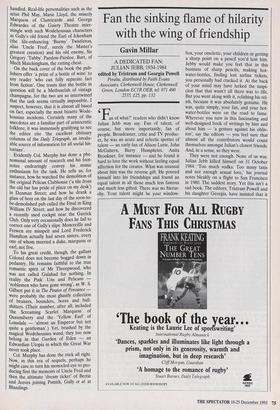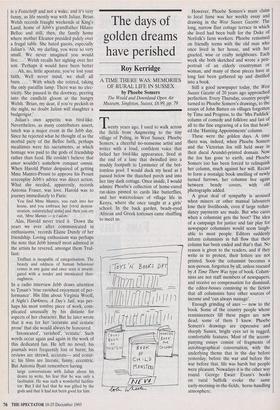Fan the sinking flame of hilarity with the wing of
friendship
Gavin Millar
A DEDICATED FAN: JULIAN JEBB, 1934-1984 edited by Tristram and Georgia Powell Peralta, distributed by Faith Evans Associates, Clerkenwell House, Clerkenwell Green, London ECIR OEB, tel: 071 490 2535, £25, pp. 132 Fan of what?' readers who didn't know Julian Jebb may say. Fan of talent, of course, but more importantly, fan of people. Broadcaster, critic and TV produc- er, he was an acute and eclectic spotter of talent — an early fan of Alison Lurie, John McGahern, Barry Humphries, Anita Brookner, for instance — and he found it hard to love the work without feeling equal affection for the creator. What was unusual about him was the reverse gift. He poured himself into his friendships and found an equal talent in all those much less famous and much less gifted. There was no hierar- chy. Your talent might be your window- box, your omelette, your children or getting a sharp point on a pencil you'd lent him. Jebby would make you feel that in this business of sharp pencils, making hot- water-bottles, finding lost airline tickets, you personally had cracked it. At the back of your mind may have lurked the suspi- cion that that wasn't all there was to life. But you went along with it, relishing his rel- ish, because it was absolutely genuine. He was, quite simply, your fan, and your hot- water-bottles were on the road to fame. Wherever you turn in this fascinating and well-designed book of writings by him and about him — 'a gesture against his obliv- ion', say the editors — you feel sure that almost all the contributors would count themselves amongst Julian's closest friends. And, in a sense, so they were.
They were not enough. None of us was. Julian Jebb killed himself on 31 October 1984. 'Too much vodka. Too many taxis and not enough sexual love,' his journal notes bleakly on a flight to San Francisco in 1980. The saddest story. Yet this isn't a sad book. The editors, Tristram Powell and his daughter Georgia, have insisted that it is a Festschrift and not a wake, and it's very funny, as life mostly was with Julian. Brian Welsh records fraught weekends at King's Land, home of Jebb's grandfather Hilaire Belloc and still, then, the family home where mother Eleanor presided palely over a frugal table. She hated guests, especially Julian's. 'Ah, my darling, you were so very small. We never imagined you would live. . . ' Welsh recalls her sighing over her son. 'Perhaps it would have been better Ah, no, little apostate, you've lost your faith. Well never mind, we shall all burn. . . . ' With which she retired, taking the only paraffin lamp. There was no elec- tricity. She paused in the doorway, peering into the candlelit gloom at the hungry Welsh. 'Brian, my dear, if you're peckish in the night, no doubt Julian will slaughter a budgerigar.'
Julian's own appetite was bird-like. Nevertheless, as many contributors assert, lunch was a major event in the Jebb day. Since he rejected what he thought of as the morbid piety of the Belloc faith, perhaps mealtimes were his sacraments, at which homage was paid to the gods of friendship rather than food. He couldn't believe that amor wouldn't somehow conquer omnia. When Harold Pinter despaired of getting Mme Mantes-Proust to approve his Proust screenplay Jebb's advice was direct action. What she needed, apparently, records Antonia Fraser, was love. Harold was to journey immediately to Paris:
You find Mme Mantes, you rush into her house, and you embrace her [vivid demon- stration, outstretched arms] and then you cry
out, 'Mme Mantes t'adore.'
Alas, Harold never tried it. 'Down the years we ever after communicated in enthusiasms,' records Elaine Dundy of her friendship. Loving enthusiasm was perhaps the note that Jebb himself most admired in the artists he revered, amongst them Truf- faut:
Truffaut is incapable of categorisation. The beauty and oddness of human behaviour comes in any guise and once seen is investi- gated with a tender and intoxicated thor- oughness.
In a radio interview Jebb draws attention to Tynan's 'true ravished enjoyment of per- formance'. His film about Virginia Woolf, A Night's Darkness, A Day's Sail, was per- haps his most sombre piece of work, com- plicated unusually by his distaste for aspects of her character. But he later wrote that it was for her 'accurate and ecstatic prose' that she would always be honoured.
`Intoxicated', 'ravished', 'ecstatic'. Such words occur again and again in the work of this dedicated fan. He left no novel; his journals were frequently lost or burnt; his reviews are shrewd, accurate— and ecstat- ic; his films are literate, funny, eccentric. But Antonia Byatt remembers having
large conversations with Julian about his desire to write, his fear that he was only a facilitator. He was such a wonderful facilita- tor. But I did feel that he was gifted by the gods and that it had not been good for him.











































































































 Previous page
Previous page